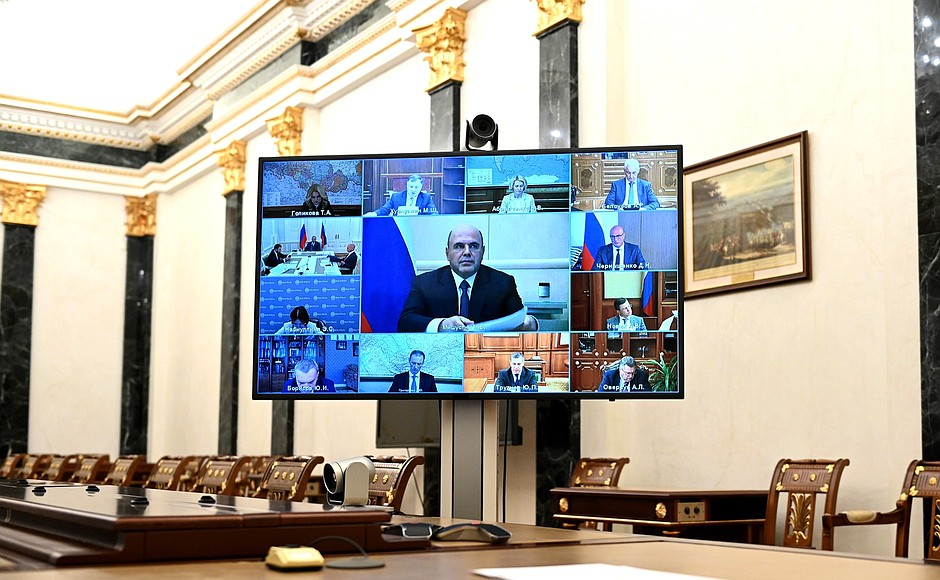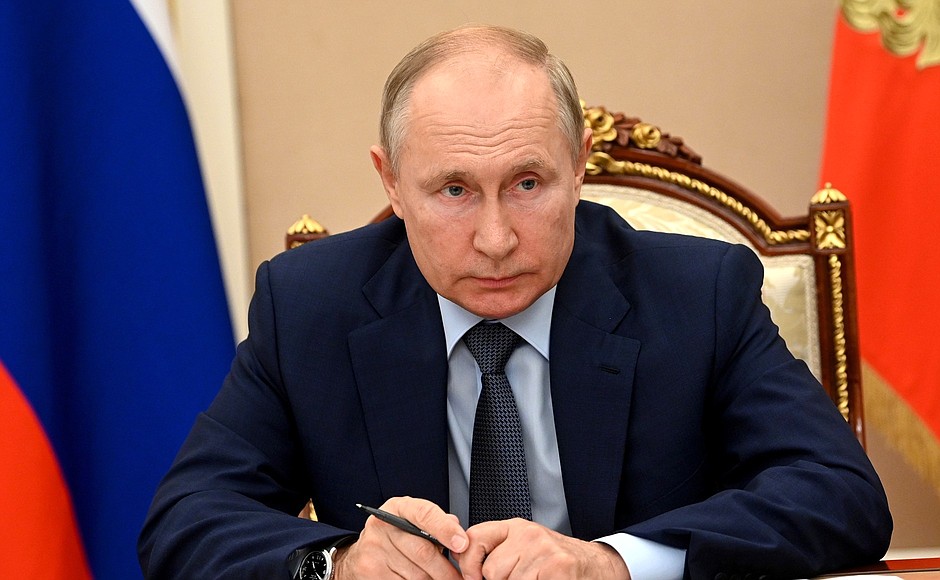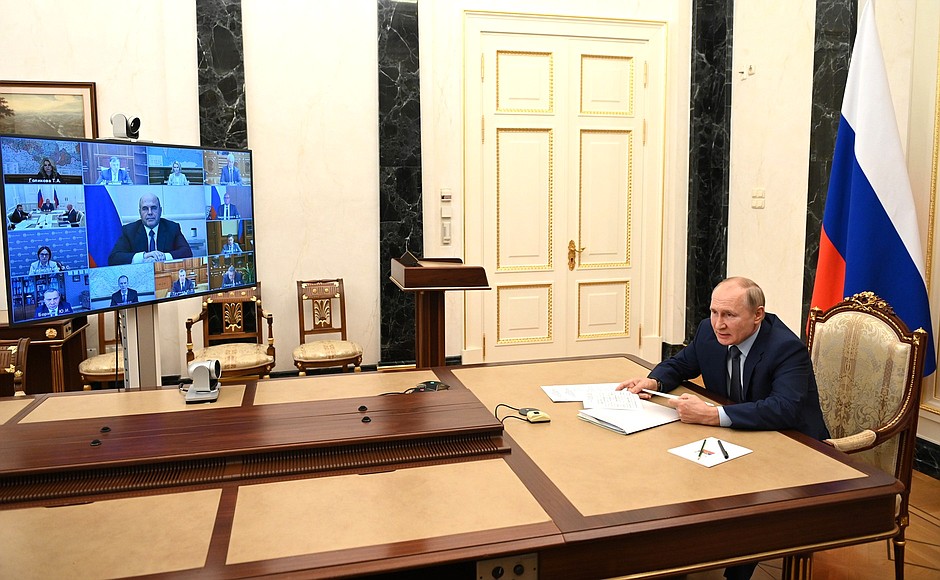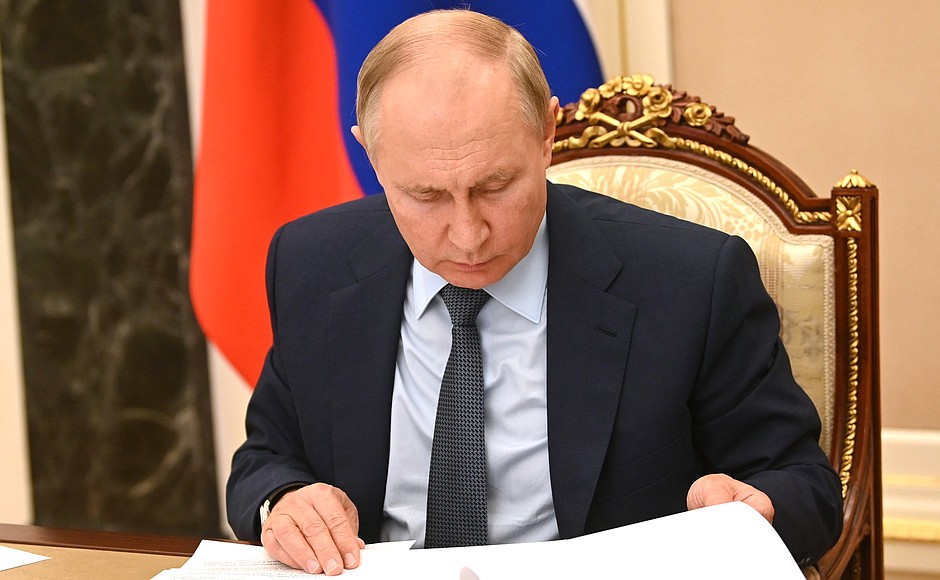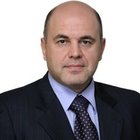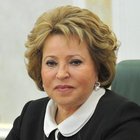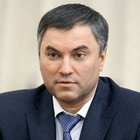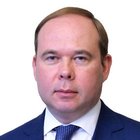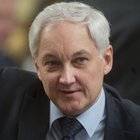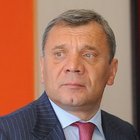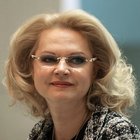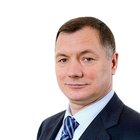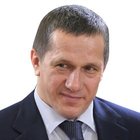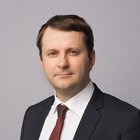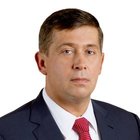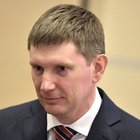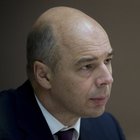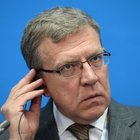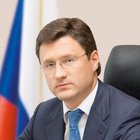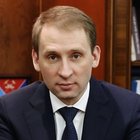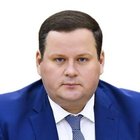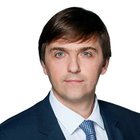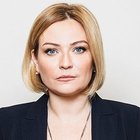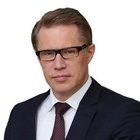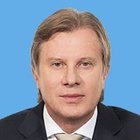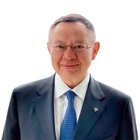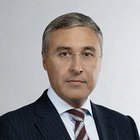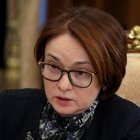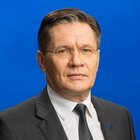The meeting was attended by Prime Minister Mikhail Mishustin, Federation Council Speaker Valentina Matviyenko, State Duma Speaker Vyacheslav Volodin, Chief of Staff of the Presidential Executive Office Anton Vaino, First Deputy Prime Minister Andrei Belousov, Deputy Prime Ministers Viktoria Abramchenko, Yury Borisov, Tatyana Golikova, Alexei Overchuk, Marat Khusnullin and Dmitry Chernyshenko, Deputy Prime Minister and Chief of Staff of the Government Dmitry Grigorenko, Deputy Prime Minister and Presidential Plenipotentiary Envoy to the Far Eastern Federal District Yury Trutnev, Presidential Aide Maxim Oreshkin, Presidential Aide and Head of the Presidential Control Directorate Dmitry Shalkov, Minister of Economic Development Maxim Reshetnikov, Minister of Finance Anton Siluanov, Chairman of the Accounts Chamber Alexei Kudrin, Presidential Plenipotentiary Envoys to the Northwestern, Southern, North Caucasus, Central and Ural Federal Districts and other members of the Presidential Council for Strategic Development and National Projects. Also attending were First Deputy Chief of Staff of the Presidential Executive Office Sergei Kiriyenko, Deputy Prime Minister Alexander Novak, Minister of Natural Resources and Environment Alexander Kozlov, Minister of Labour and Social Protection Anton Kotyakov, Minister of Education Sergei Kravtsov, Minister of Culture Olga Lyubimova, Minister of Industry and Trade Denis Manturov, Minister of Healthcare Mikhail Murashko, Minister of Transport Vitaly Savelyev, Minister of Construction, Housing and Utilities Irek Fayzullin, Minister of Science and Higher Education Valery Falkov, Minister of Digital Development, Communications and Mass Media Maksut Shadayev, Governor of the Central Bank Elvira Nabiullina, as well as several regional heads and Rosatom CEO Alexei Likhachev.
Excerpts from transcript of meeting of the Presidential Council for Strategic Development and National Projects
President of Vladimir Putin: Good afternoon, colleagues. I am glad to welcome everybody. Let us begin.
In May 2018, we outlined the key areas of our work until the middle of this decade, and last year, in July 2020, we extended our planning horizon to 2030. The decision was made considering the speed and scale of social, economic and technological transformation happening in Russia and the world in general.
Our country must not only respond to these challenges but be the leader of global changes. We have everything to become one. We need to set and solve everyday tasks, which build up, and remember systemwide tasks as well, as they both create the canvas of long-term development.
Certainly, the aftermath and challenges of the pandemic require certain adjustments to certain plans, but again, this does not mean that we are changing our strategy. On the contrary, the responsibility of authorities at all levels is to speed up the pace of work and stay committed to our priorities while making tangible changes happen.
I would like everybody to note that the programme we are implementing received public support during the 2018 presidential election. Therefore, it must be finished, no question about it. Our citizens’ expectations are justified.
In this context, I propose that today, we give an objective appraisal to the results achieved and see what has been done and where we need additional resources and decisions. I also suggest that we thoroughly discuss our plans and practical steps for the period until 2024.
I would like to note that, despite all the challenges, despite having to mobilise our resources to counter COVID-19, we have consistently moved forward – because our common national goals, which are close and relatable to every Russian citizen, have stayed in our sight, even in the most difficult time. These goals include developing our regions, cities and rural areas, creating new jobs, and ensuring the wellbeing and decent income of Russian families, so that more children are born and have equal opportunities for education and development.
Over the past several years, we have been creating an integrated system of support for families with children and taking the necessary decisions step by step. We already provide benefits to the parents of children aged seven and younger. You also know that starting July 1, monthly benefits will become available to pregnant women in need and single parents with children aged 16 years and below.
Free hot meals are available for over 7 million schoolchildren, which is virtually every primary school student. There are still issues to address, but overall, the system is working. In August, families will also receive a one-time payment of 10,000 rubles per child aged 6 to 17.
Last year, more than 3.5 million Russian families improved their living conditions mainly thanks to reduced mortgage interest rates, including for families with two or more children. Starting this year, mortgage concessions are available to parents having their first child.
The housing construction industry is operating ahead of schedule. By the end of this year, more than 85 million square metres of housing will be finished and commissioned. Essentially, we are about to achieve the best performance rate in modern Russian history in terms of housing. I would like to ask the Government to consistently expedite this programme as reserves are not exhausted. I would like to see the same strong positive dynamic across all areas which are significant for the public.
For example, there has been serious progress in education. I am talking about creating new places in schools and developing study programmes that focus on natural sciences and technology. As we specifically agreed during the recent congress of the United Russia party, in the next five years, schools will undergo major renovations, especially schools in small towns and rural areas. These projects will also expand to bigger local infrastructure for modern life, including cultural centres and others.
With regard to vocational training, over 1,500 colleges and technical schools have been equipped according to international standards. There are increasingly more higher learning institutions in our regions where the quality of training and research activities is recognised internationally.
Training highly skilled personnel, just like accelerated scientific and technical development, has become a critical item on the national agenda with many government services now available in electronic form, which is as simple and convenient as it gets.
Advanced solutions, including artificial intelligence and big data analysis, are increasingly used in everyday life, the financial sector, healthcare, and almost every sector of our economy. It is imperative to provide additional support to this confident progress in innovations, including through providing incentives and fine-tuning the regulatory system.
There is one more important aspect to it. Thanks to responsible and flexible macroeconomic policy, as well as measures to support entrepreneurship and high-tech industries, we were able to provide quick relief to the aftermath of the crisis.
For example, economic growth will amount to about 4 percent by the end of the year, I hope that it will be close to that figure. It is necessary to use these positive developments to improve living standards, because this is the ultimate purpose of economic growth and its key result. One must always see a specific individual and their problems behind macroeconomic indicators.
So, now the unemployment rate is already practically back to what it was in 2019. Back then, we had it at 4.7 [percent], now it is already at 4.9, but this is an average number, statistics, and we know that many people are still struggling to find a job or are employed only part-time. We will cover unemployment among young people in depth. These issues need to be consistently addressed.
Colleagues,
We are well aware of the fact that major achievements go hand-in-hand with a significant number of matters that remain unresolved and which people find sensitive. These are, primarily, poverty, low income levels in many families, substandard primary care, and the deterioration of school buildings. As you are aware, people mentioned these and other sensitive issues during the Direct Line programme.
To reiterate, we need to step up the pace of change in the economy and the social sphere, as well as the development of our regions and infrastructure, in addressing environmental problems and achieving the goals of the country's digital transformation. Whenever possible, we should be setting our sights higher, striving to achieve more ambitious goals, and we should not look for excuses to delay the fulfilment of our promises to the people “until later,” or “at some point.”
Thus, we agreed to launch construction with the use of infrastructure loans as pilot projects in the Russian regions already this summer. However, to my knowledge, these projects have not yet been approved. We will discuss this now, and maybe something has been done very recently in this respect, although by the end of 2023, the amount of work on these projects is supposed to exceed half a trillion rubles. This is how it looks in figures.
For people this means the construction of roads, communal and other vital infrastructure facilities in their regions in the next two years. Importantly, some facilities must be put into operation or be near completion. I would like to ask regional governors to pay continuous attention to this issue and to work closer with the Government in this regard.
People are waiting for accelerated, dynamic development of the areas where they live. I would like to say right away that we are not going to reschedule the implementation of the tasks that have been set.
Before we start discussing the agenda, I would like to draw your attention to the following issues and hear what you think about them.
First, I suggest you look at what you have done on each national goal, note the existing problems and set very practical tasks that you will carry out by 2024. I would like to hear detailed reports about this.
Second, I know that the Government has prepared new initiatives. I have talked with Mr Mishustin about them today. Let me say right away that they should not override but supplement the earlier decisions and ensure the unconditional implementation of the national goals. Let us discuss your proposals in this vein.
I would also like to mention that when the Government was formed, I proceeded from the premise that it would consist of the people who drafted these goals and are well versed in this subject, as well as newcomers with a fresh look on these materials. They will make up a team that will lead us to common success.
I would like to stress once again that one thing should not replace the other, but it is clear that life goes on and makes its own adjustments, and our plans and ways of achieving our goals must reflect them. But we know what goals we have. We have set them, and we must reach them.
Let us start working. We agreed that Mr Mishustin will say a few words in the beginning, and then the colleagues will expand on what the Prime Minister has to say. We will talk in more detail about all the issues we agreed to discuss today.
Mr Mishustin, go ahead please.
Prime Minister of the Russian Federation Mikhail Mishustin: Mr Putin, colleagues,
Mr Putin, you have just said in your opening remarks that a year ago, the planning horizon was extended until 2030. The implementation of the national goals is the most important target reference point for the Government to prepare qualitative changes with account taken of the ambitious tasks set before us and new challenges. The Government is working actively on the strategic initiatives in keeping with the instructions you gave at the Council’s last meeting in December 2020 and in the Address to the Federal Assembly in April of this year.
Today, we will present a set of strategic initiatives in the field of socio-economic development. This, as you mentioned, is a natural continuation of several years of systemic work. These initiatives fuse the state programmes, national projects and national goals into a single whole. They are designed to reinforce the earlier long-term decisions, and the key target point for us is, as before, are the national development goals, which you, Mr Putin, have outlined for the next 10 years. The national projects have also been fully adjusted to fit them. I would like to point out that the level of national project attainment indices is 10 percent higher in June of this year than last year. Eighty percent of more than 200 indices has been attained and practically 90 percent of over 1,200 events has been implemented.
As I have reported to you, we have worked hard to convert the Government’s operations to project management. This has been done with regard to both national projects and state programmes. The work to adjust the state programmes is being culminated.
To work out all ideas and proposals, the Government’s Coordination Centre has established five working groups, I have already reported on this in detail, and evolved over 250 initiatives. We have invited several thousand specialists to join this work, such as some of the best experts, practical workers, representatives of institutes and scientific schools, heads of regions, business people and, of course, our colleagues from federal executive agencies, the Presidential Executive Office, the Audit Chamber, the State Council, and the Bank of Russia. I would like to thank all those, who have traversed this long path together with us as a single team.
In particular, I would like to thank you, Mr Putin, for your support during the preparations of these initiatives. You and I discussed in detail all the aspects of this work from new technologies, education, and healthcare to, for example, the Pushkin Card. Your focus on this process was of great importance for us. As of today, we have selected 42 initiatives that have been studied by our Coordination Centre. Following their consideration at the Council meeting, if you approve them, they will form part of a single plan directed at achieving the national goals.
Mr Putin, while visiting the Coordinating Centre, you noted the importance of feedback from ordinary people in the process of working on all the initiatives. This has become a mandatory part of our operations. We have had several rounds of polls among citizens of Russia, including via the internet, on each initiative. Incidentally, the most active respondents were people aged between 25 and 39, they made up almost a half of the total, with one in every two participants in the polls prioritising initiatives in the field of ecology, health, better quality of life in the cities and state-provided services.
Today's package of proposals has been formed by ranking them on the basis of people's opinion. As you mentioned, we have processed all the information we collected. This is actually the only way, namely having people assess specific ideas to put together a broader picture in order to make the appropriate choice.
The coronavirus pandemic has exacerbated the problems that already existed in the global economy, created new challenges, primarily risks to macroeconomic stability, and it would be wrong to ignore them, although Russia’s economy has shown a high level of resilience during the pandemic. You have just said that economic recovery is progressing better than expected, and that positive trends in investment continue. We will carry on work to improve its stability. The new initiatives that we will present will add flexibility to the socioeconomic system, make it quickly adjustable to the fast-changing environment and, accordingly, will minimise any deviations from the plans that are possible with extended planning periods.
Mr President, the initiatives for social and economic development proposed by the Government are not going to affect the balancing of the budget; they were developed with due account of the available resources required. We have retained the main federal budget indicators and targets for development funds, and we clearly have an understanding of which sources we will use to fund the new projects. The total cost of these initiatives – I will say this again, overall – will be 4.6 trillion rubles for the next three and a half years. Most of this amount will come from the budget, and the resources are already there; the rest will be contributed by private investors, state-owned companies, and development institutions. Another 736 billion rubles will need to be allocated from the federal budget and from the National Wealth Fund.
I would just like to point out that all the social and other obligations, including the increased ones will be completely met. Russians will receive all the payments, benefits, and pensions they are entitled to on time, and earlier socially-oriented decisions will be carried out proactively. The Government will keep this spending under close review.
All initiatives have, for the purposes of discussion, been divided into six groups: social, construction, environment, digital transformation, technological breakthrough and service state. My deputies are each supervising one of the groups. They will tell you more about this. But I would like to highlight several key points.
I will start with the measures aimed at social development. They directly concern people's health, opportunities for self-realisation and developing their talents.
In your Address, you noted the need for creating Russia’s “sanitary shield.” This is what one of our initiatives is called, and it involves the deployment of a nationwide chain of user-friendly laboratories for quickly diagnosing infections, for decoding any unknown virus and developing a test kit for detecting such viruses in no time at all. This network would also make it possible to quickly manufacture safe and effective vaccines. Of course, we cannot forget about primary care either. We must make sure that all people receive regular medical attention, so that they will not have to cope with diseases on their own.
Post-disease and post-injury rehabilitation is another important aspect. We are set to upgrade the medical rehabilitation system. As you noted in your Address, virtually all medical rehabilitation departments and centres must receive modern equipment in the next ten years, with Russian-made systems to account for at least 50 percent of this equipment. We will publish a list of upgraded facilities, so that people know where they can get treated for specific problems.
The social treasury project will get a new lease of life. We are establishing an entirely new digital system for providing targeted social assistance to people, so as to eliminate any paper documents or certificates. We will move to a proactive model of providing government services, and people will be able to obtain them in minutes, rather than days.
Efforts to make industrial careers more popular are an important task facing the education sector. We will have to train specialists in about 200 fields and occupations. We are planning to introduce computer programming courses at schools and digital departments at universities, so that young people can boost their skills. We need this in the context of our plans to provide access to the internet and modern communications services, including in small communities and remote areas. People all over Russia will be able to receive government services as regards the provision of payments, benefits and certificates. We are working hard to create this system, and we are also implementing our digital transformation plans.
The construction sector needs fast and simple procedures, and we are already working to reduce redundant procedures and obsolete regulations. This will allow us to keep up the rapid pace of housing and social facilities construction. We will make it possible to use new digital solutions, including the 3D modelling of buildings.
Regarding environmental protection, we suggest implementing an initiative to facilitate low-carbon economic development. Russia would thus make an important contribution to reducing greenhouse gas emissions. This calls for creating an industrial emissions accounting system.
Regarding projects in the sphere of technological development, I would like to draw your attention to the idea of creating our own electric cars, including models running on hydrogen. We will also promote high-tech projects in microelectronics, wireless communication and the creation of new materials, and we will create and market unmanned vessel services. New technology will allow us to increase the speed of maritime cargo shipping, reducing the maintenance costs of our shipping companies by billions of rubles. Altogether, this will seriously improve the national transport logistics.
We will pay special attention to clean energy projects. One of them stipulates the creation of a line of industrial equipment for the production and use of hydrogen, plus the construction of hydrogen power facilities, in the Arctic zone among other places. Experts believe that our efforts in this sphere can help us to reduce carbon emissions by several million tonnes a year, and our plans in the sphere of new nuclear energy systems are designed to ensure a fail-safe supply of low-carbon energy to isolated regions. The expected result stipulates the launch of four small floating nuclear power stations and small-scale pilot land-based nuclear power stations. One important idea provides for creating an ecosystem of technological businesses at our universities, which will in fact operate as incubators producing thousands of high-tech startups. You mentioned the importance of this on many occasions.
The complex of strategic initiatives, which we are discussing today, is not only aimed at stimulating the country’s socioeconomic development, but it will also incentivise industrial development. The expected overall result of the implementation of the decisions made and new initiatives will be the growth of high-tech and service sectors in the economy and also an increase of highly paid jobs within individual industries. The ultimate goal is to improve the quality of people’s lives.
Mr President, if you support our proposals today, we will build all of our projects into the existing mechanisms, namely national projects and state programmes, and we will start implementing them as early as this year. At the same time, we will continue to receive feedback from the people, adjusting our activities, if necessary. Each deputy prime minister is ready to explain the initiatives they are overseeing in their particular spheres.
This concludes my report.
Thank you.
Vladimir Putin: Thank you, Mr Mishustin.
Please go ahead, Ms Golikova
Deputy Prime Minister Tatyana Golikova: Good afternoon, Mr President, colleagues.
Mr President, your executive order lays out national objectives for supporting the population, its health and well-being and opportunities for self-realisation and skill development. The targets clearly define the first ones: ensuring sustainable growth of the population of the Russian Federation and increasing life expectancy to 78 years. Unfortunately, the increase in the mortality rate caused by COVID-19 and its side effects has changed the positive dynamics of these indicators. However, in the first five months of 2021, compared with the same period in 2020, the number of deaths from malignant tumours decreased by 2.3 percent, tuberculosis by 10.4 percent, and diseases related to HIV infection by 14.1 percent. The infant mortality rate continued to decline, down by 2.3 percent over this period.
Notably, in 2021, the rate of decline in the birth rate slowed substantially and was at its lowest in the past five years. According to the data at hand, in 2021 we saw statistics showing an increase in the birth rate compared to the same period last year, twice in March and in June. Also, over the past several years, we have noted an increase in the absolute number of women giving birth to a third and subsequent child in a family. This means that the family support measures are working.
The experience of combating the novel coronavirus infection and its aftermath predetermined the need, as Mr Mishustin noted, to identify new solutions designed to preserve the population, its health and well-being. A sustainable healthcare system is our top priority.
(Ms Golikova described three new projects. The first is the expansion of the Primary Care for Everyone programme aimed at modernising the infrastructure. A single digital service named Health is also in the works. Starting from 2021, users will be able to obtain information about the consulting physician, test results, vaccinations, subsidized medicine and risk factors on the public services website and in the My Health mobile app. Particular attention is being paid to annual check-ups and medical rehabilitation. The third project, Medical Science for the People, involves the creation of a single mechanism for coordinating scientific medical research. A pilot project to create an individual genetic health medical card will be carried out as well.)
Another lesson of the pandemic is the need to ensure the sanitary and epidemiological security of the country. In pursuance of your instruction, we have developed the Sanitary Shield project. Implementation should result in preventing the import of dangerous infections into the country and the development of pandemics, as well as in the ability to develop new test systems for new infections in four days and vaccines against them in four months.
By 2024, express testing will be ensured at more than 240 checkpoints, the existing laboratories will be upgraded and new ones will be built. Fast, high-quality and timely diagnosis of infections within 24 hours will become available to 80 percent of Russians. There are also plans to create an information resource where anyone can access reliable information on the state of the environment and the epidemiological situation. For these purposes, we propose allocating an additional 30 billion rubles by 2024.
(The Deputy Prime Minister noted that the Preservation of the Population, Health and Well-Being of People national project involves not only measures in the field of healthcare, but also the solution to issues of well-being of citizens and the fight against poverty. Tatyana Golikova dwelled on providing measures of state support for citizens, various payments and benefits. The Social Treasury project has been developed, which involves every citizen, with the goal of providing quick and targeted social support. Thanks to a variety of data about each person, the system will allow for identifying those who need help and offer it without waiting for the person to ask for it. This approach will help reduce the poverty rate to 10.9 percent in 2023, to 10.4 percent in 2024, and to 6.5 percent by 2030.
In addition, Ms Golikova spoke about changes in the labour market, including growth in the IT industry, construction, healthcare, social services, and creative industries. Industries that will shrink are transport, financial and administrative activities, public administration, and agriculture.)
Now, following your instruction, we are working on a system-wide long-term programme to promote youth employment, while at the same time transforming the secondary vocational education programme. We are offering a new programme, Professionalism, after you confirmed its importance at the United Russia congress. The project contributes to the achievement of two national goals at once by creating opportunities for self-realisation and influencing people’s living standards based on market demand for their services with decent wages.
(Tatyana Golikova continued to describe the essence of the Professionalism programme. The Government and the Russian Union of Industrialists and Entrepreneurs have identified pilot industries for this project, including the nuclear industry, metallurgy, mechanical engineering, petrochemical industry, transport, mining, and pharmaceutical industry.
Another large interdepartmental project is Designed in Russia. Its goal is to create a support system for the industries related to creativity and art. That project is to follow up on the Presidential Foundation for Cultural Initiatives created this year.
There are some tangible results achieved when it comes to the national goal Opportunities for Self-Realization and Skill Development. At the end of 2020, the Russian Federation’s weighted average ranking across international assessments that monitor trends in general student achievement was 13.5 with a target of 14. According to the Deputy Prime Minister, by 2024, Russia will be as close as possible to 12th place and will maintain the upward trend towards joining the top ten world leaders in general education.
The discussion also touched upon the launch of a programme for major repairs of schools; the new project Pushkin Card, which will be issued to Russians aged 14 to 22 and allow them to visit cultural facilities free of charge; and the project Business Sprint (I Choose Sport), aimed at creating an accessible and popular physical fitness infrastructure, taking into account people’s needs.)
Mr President, the pandemic continues to affect our plans, but we are learning to live in these new conditions. We believe that the measures we are implementing, and several additional measures, will help us attain the national targets and overcome negative trends, including when it comes to the mortality rate and life expectancy.
Thank you.
Vladimir Putin: Thank you very much.
Colleagues, here is what I would like to point out. The issues Ms Golikova raised just now are our top priorities because they directly affect people’s lives and the quality of life.
Take our plans – we have a whole programme – for building preschool facilities for kids under three, which we had to reschedule for later for a number of reasons, and now we are below the target by approximately 100,000 places. We did this with our eyes open. I would like to point out now that this programme must be carried through, and we must do everything we planned to do.
According to the FSO (Federal Guard Service), which conducts regular opinion polls at a professional level, as you are aware, people’s satisfaction with the quality of medical care has not improved, unfortunately, which you know for a fact.
Mr Murashko, you are aware of these surveys aren’t you?
Healthcare Minister Mikhail Murashko: Yes, Mr President, I do know about them. Since the healthcare system was overstretched during the past year, and the number of telephone calls for an ambulance and also appointments made at outpatient clinics went up during some periods, we are closely monitoring the situation and have coordinated a package of measures.
Vladimir Putin: Yes, I see. All of us worked under extremely difficult conditions, and the healthcare system was overtaxed, which is obvious and understandable.
On the other hand, I would like to ask the following: we have practically launched a primary care programme. The funding is quite substantial, over 500 billion rubles, or more precisely, 550 billion. In this context, patient satisfaction figures should be added to the list of indicators for measuring the quality of our work. Yes, I am aware of all the problems, and I know that you postponed the revitalisation of the primary care programme a little, but we are launching it now, and this system-wide indicator should be taken into account.
We must know, just as we have said many times, just as our colleagues in the Government and I have, that we do not want things to simply look good on paper, we want to see the real state of affairs in society and practical results for the people. What does this mean? It is reporting back, feedback that must be regarded as one of the main indicators.
As for changes in the population numbers, you are very well aware that between 2012 and 2018 the population in Russia increased by 3.8 million. Unfortunately, after that the situation with the birth and mortality rates deteriorated for a number of reasons, namely two demographic pitfalls and the terrible COVID-19 virus. But we must analyse the situation thoroughly, because we are investing huge funds, including in the areas Ms Golikova has touched on just now, plus in the primary care sector I mentioned. We must see the effect, which is why I would like to ask the Government to take a closer look at this indicator. Of course, we must set realistic goals, but they should also be ambitious. This includes life expectancy, which is set to increase to 75 years by 2025. As I see it, this goal has not been removed from the agenda; we must not forget about it, and we must keep working on it.
And lastly, regarding the target indicators for reducing poverty, yes, of course, the pandemic, its effects on the economy and on small and medium-sized businesses, and the decreasing incomes of the people – I can understand all of this. But the real value of wages will increase by the end of the year, as we say. I didn’t think up the figure 3.9 percent, it was the Government that said that the real value of wages can increase by up to 4 percent, and the Economic Development Ministry seconded that view. We must take a look at the figures. Wages must grow, they are growing, and so the poverty alleviation target must be adjusted as well. I would like you to do this.
Thank you.
Please, Mr Khusnullin.
Deputy Prime Minister Marat Khusnullin: Mr President, colleagues,
In implementing the Comfortable and Safe Living Environment national goal, after the first six months we can see positive trends with all the indicators. For example, according to Rosstat’s preliminary data, the amount of new housing commissioned in the first six month is 23 percent higher than over the same period last year. This year, we have set ourselves the task of ensuring a record level of new residential accommodation: at least 85.6 million square metres of housing, which is 10 percent more than our preliminary targets as part of the national project.
In addition to this, according to preliminary data, during the first six months, 1.75 million families improved their living conditions, which is 30 percent more than over the same period last year.
These indicators were possible thanks to the work of Government and regional staff and, as you said, with the support of governmental mortgage programmes. For example, during the first six months of the year, according to preliminary data, about 940,000 mortgage loans were issued, worth 2.7 trillion rubles, which is 44 percent in quantitative terms and 7.4 percent in monetary terms more than during the same period last year.
(The Deputy Prime Minister spoke about the implementation of the programme to create a comfortable urban environment, under which 227 projects are being implemented in 73 regions. He also discussed road construction and the creation of a backbone network of roads: a transport framework of the national road network, the most popular roads used by the absolute majority of the population. A number of initiatives in the area of socioeconomic development were also touched upon, including the support of individual housing construction and the development of public transport. In order to develop the infrastructure in the regions the Infrastructure Menu initiative was prepared, including key measures of financial support for the Russian regions.)
Another initiative involves a new rate of construction; the task is to decrease the investment and construction cycle by at least 30 percent. The initiative does not require additional funding. However, according to preliminary calculations, in the event that the project is fully implemented, it will attract up to two trillion rubles of additional funds to the construction sector annually by saving and accelerating the turnover of funds for construction. The main thing stipulated by the initiative is the removal of administrative barriers. We have already legislatively reduced the number of administrative procedures from 96 to 32.
Digitisation is the next subject. Our goal is to digitise all 32 procedures needed for construction, and to introduce the BIM technology. From January 1, 2022, all state contractors will have to design and build facilities using the BIM technology. Although this is a difficult task, we are making progress.
Third, we must manage capital investment volumes at all levels of government more effectively.
Our main goal is to shorten deadlines and simplify in-house procedures while building budget-financed facilities. In addition, in the area of capital investment management, we must improve the system for awarding state contracts. We can now see that projects are becoming more expensive, so we have drafted decisions and we will shortly suggest that they are approved.
Despite all the COVID-related challenges, we strive to achieve all of the national goal’s parameters in 2021 and in the years to come. The decisions that have been adopted allow us to create the necessary conditions. Consequently, the current task facing us and the regions is to work, work and work.
Thank you for your instruction to assess infrastructure options as quickly as possible and to boost housing construction this year, as well as in the coming few years. We must carry out this system-wide work because of the lengthy construction investment cycles until 2024 and 2030, respectively.
Thank you for your attention and support for the construction industry.
That concludes my report.
(Later, the discussion dealt with access to loans for private housing construction projects with the participation of Central Bank Governor Elvira Nabiullina. Replying to the President’s questions, Marat Khusnullin discussed the drafting of the Mobile City programme, as part of the Safe and High-Quality Roads national project. The programme deals with municipal transport. He also focused on the programme for renovating and overhauling schools, as well as measures to support certain companies due to rising construction costs).
Vladimir Putin: Right then, good. Thank you very much.
Ms Abramchenko, you are welcome.
Deputy Prime Minister Viktoria Abramchenko: Mr President, Mr Prime Minister, Colleagues,
It is impossible to achieve the Comfortable and Safe Environment for Life national goal without the implementation of environmental measures. The recent Direct Line confirmed this. People are worried about the problems concerning household waste, landfill sites and emissions. Even the climate is now the focus of Russians' attention. Our job for each of the most pressing issues, including waste management, accumulated damage to the environment and clean air, is to achieve some tangible results as quickly as possible.
There are five success parameters when it comes to the matter of waste management. This is a decrease in waste production and disposal, a transition to separate waste collection, the introduction of the “polluter pays” mechanism, the creation of processing and recycling facilities and a second life of waste through circular economy tools.
Some of the activities are being implemented as part of the Integrated Solid Waste Management System federal project of the Ecology national project. Eighty-two of the Russian regions, in which 174 regional operators are working, have already switched over to the new SW management system. The coverage of the population with this utility has reached 94 percent. The year 2020 showed that it is necessary to monitor the well-being of regional operators on a permanent basis.
We have completed the formation of an electronic model of the federal waste management scheme. It is an information system that provides monthly data from 1,300 industry participants. The system sees the whole country, we plan to complete its integration with GLONASS this year, which will allow the tracking of the movement of all rubbish collection vehicles in real time. Now the system contains data on all existing and prospective processing facilities: placement, decontamination and disposal of waste. There are more than 2,000 facilities. In two years, 105 infrastructure facilities have been built for a total amount of more than 50 billion rubles. This year, we plan to put into operation another 46 new facilities with a processing capacity of over six million tonnes and a disposal capacity of over two million tonnes per year. For the first time this year, we are allocating 6.2 billion rubles to co-finance the creation of some new facilities. These are federal funds on preferential terms at three percent per annum. This will make it possible to create by 2023 new facilities with a capacity of more than four million tonnes per year with a total investment of about 20 billion rubles.
(Viktoria Abramchenko continues to report on setting up and upgrading waste container sites, including for separate collection of waste, as well as on the support measures for the industry through the Russian environmental operator, and the urgency of measures to reduce waste and incorporating waste in the economy.
Specifically for this purpose, the closed-cycle economy initiative had been proposed as part of the Socioeconomic Development Strategy until 2030. The initiative has had the effect of 50 percent less landfill and 50 percent less primary products; three rubles of private investment has been provided per ruble of budgetary allocations to develop the necessary infrastructure. There is a plan to build 12 eco-friendly technoparks by 2030. Another initiative is “deep cleaning” of the country – specifically, cleaning landfills, abandoned ships, wells, industrial sites and other accumulated harmful facilities.)
The Government has already drafted two major packages of federal bills. The package of bills on the scrappage of vessels was approved at the Government meeting last Thursday. The bill on financial responsibility of company owners for eliminating accumulated damage and reclamation of industrial sites is being updated based on comments from the State Legal Directorate.
The second problem we are working on right now is optimising the costs of elimination efforts. We are collecting technological solutions and essentially creating a new industry that deals with industrial waste. Feedback from the public is an important part of this project. We plan to set up an environmental call centre. The Ministry of Natural Resources has reports on reclamation of landfill sites and recovery of ships available on its website.
The third thing that the public is concerned about is curbing emissions. We are conducting an experiment on quoting emissions in 12 cities which are participants in the Clean Air federal project of the Environment national project. The target is to reduce the total amount of pollutants by 20 percent by 2024.
Mr President, as per your instructions following the Address to the Federal Assembly, the Government has discussed scaling up the experiment to twelve cities and towns, to all city-type residential areas and city districts with high and extremely high air pollution.
In cooperation with State Duma deputies and senators, we developed, within a short amount of time, a federal law that expands the emission quoting system to residential areas, city districts and territories in the Russian Federation with a high and extremely high level of air pollution. The law took effect on July 2.
Following environmental monitoring, we have identified the residential areas with high air pollution. The list includes 48 cities and towns. As per your instruction, our goal is to reduce hazardous emissions that have the biggest negative impact on health and the environment by half, by 2030.
Another initiative closely connected to the quality of air in the atmosphere is the low-carbon development policy. Mr Mishustin has already briefly discussed this initiative. Our goal in order to fulfil your instructions is to create a nationwide system of high-precision monitoring and recycling of climatically active gases, reduce the volume of net greenhouse gas emissions accumulated from 2021 to 2050 to lower numbers compared with the European Union, increase the absorbing capacity of Russian ecosystems to 2.5 billion tonnes of CO2-equivalent per year, and develop measures to adapt to climate change.
This initiative does not only impact the Comfortable and Safe Living Environment national goal. It impacts all five national goals. At the first stage until 2022, we plan to ensure the adoption of plans to adapt 10 economic sectors and all 85 Russian regions.
By 2024, a greenhouse gas monitoring and accounting system will be created on the basis of at least 16 carbon testing grounds in all the climatic zones of Russia, as well as a system for the accounting and circulation of carbon units. The priority research programme in the field of climate will be completed too.
Mr President, all your instructions on the environment will be fulfilled on time, and now we have instructed all our colleagues to move the deadlines up, if possible, and we will achieve as much as possible.
That concludes my report.
Thank you for your attention.
Vladimir Putin: Thank you.
(Next, at the President’s initiative, the meeting participants discussed specific issues related to the implementation of the plans and projects Viktoria Abramchenko talked about, in addition to businesses’ readiness to participate in them. Taking part in the discussion was President of the Russian Union of Industrialists and Entrepreneurs Alexander Shokhin.)
Vladimir Putin: I would like to address Ms Abramchenko and Mr Shokhin. I understand it was difficult to sign the documents [agreements with polluting enterprises worth 495 billion rubles of private investment in the environmental upgrade in total]. Thirty-three agreements have been signed, and there are a lot of nuances. However, it is even more difficult to monitor their implementation. Don't we know how it works? You have been working and writing, but it is not important what is on paper but what is in the air.
Ms Abramchenko, how do you plan to oversee the implementation of these agreements?
Viktoria Abramchenko: Mr President, we have prepared the necessary regulatory framework. Russia has had no methodology for calculating damage to atmospheric air for a very long time now. I am aware that colleagues from businesses are not very happy with this methodology because they are worried it might turn into an “environmental sword” for businesses. For our part, we certainly do not want to use it so quickly and easily; we want this tool to have a sort of sobering effect on businesses.
You are aware of a series of major accidents that took place last year that triggered off environmental disasters. This led to huge fines for the disruption of fragile ecosystems and the violation of environmental laws. Therefore, I believe the state and businesses have a shared interest in fulfilling these agreements.
Vladimir Putin: You need to ensure the monitoring and oversight of this. The oversight must be effective, otherwise it simply will not work.
Viktoria Abramchenko: Oversight will be ensured by the network of Hydromet stations, independent automatic monitoring and a network of Rospotrebnadzor labs, which immediately can detect these dangerous substances.
Vladimir Putin: I recall that you helped me prepare for the Direct Line, and I remember what you told me about it. I remember everything. We just need to do it.
Viktoria Abramchenko: We will do it, Mr President.
Vladimir Putin: Up to the point where we need to install a monitoring device on those pipes. It is no big deal. But it will make things clearer, give us an objective picture immediately. And in the end, it will not raise the price of products, this is just nonsense. Nothing terrible is going to happen. It is better to install the appropriate equipment now than to pay multi-billion fines later. Look at all these issues.
Alexander Shokhin, President of the Russian Union of Industrialists and Entrepreneurs: Mr President, I would just like to add that it is very important that technological re-equipment is underway at many enterprises, but the problem is not only about treatment facilities, or about reducing emissions from the current production and current technologies. It is very important to stimulate investment. We also have methodologies such as the best available technologies and mechanisms for making companies implement these BATs. The Ministry of Industry and Trade is responsible for them. We have seen good progress in this field, and we believe we need to continue moving vigorously.
Vladimir Putin: All right, good.
Ms Abramchenko, how many unauthorised landfill sites within the city boundaries should be eliminated by 2024?
Viktoria Abramchenko: There are 191 landfill sites within the city boundaries.
Vladimir Putin: How are the preparations for the design estimates coming along?
Viktoria Abramchenko: To be quite frank, the regions are delaying the design and estimate documentation. Therefore, one of the “general cleaning” problems we identified is non-transparent pricing, which leads to huge differences in estimates for similar projects, up to 30 times. So what we need to do first – the regions and the Natural Resources Ministry should cope with this job, they are almost done in fact – we need to categorise landfill sites by a landfill body and by morphology. Having done this, we will be able to clearly estimate by the same standard how much the reclamation of each specific landfill site will cost. We must complete this job this year.
Vladimir Putin: What kind of assistance do you need? Shall I instruct plenipotentiary envoys to help you in dealing with the heads of regions?
Viktoria Abramchenko: It would be fine if the plenipotentiary envoys do their bit.
Vladimir Putin: It is a deal then.
Mr Vaino, do you hear us?
Chief of Staff of the Presidential Executive Office Anton Vaino: Yes, Mr President, your point is taken, will do.
Vladimir Putin: Draft the instruction, please.
OK. As regards Baikal, we should have organised the construction of purification works. Do you know what is going on over there?
Viktoria Abramchenko: The programme to build purification works in the Republic of Buryatia is proceeding fine. The construction project has been launched in the entire water collection area that influences the quality of discharges and the condition of Lake Baikal, and the necessary funds have been allocated. As for the construction of purification works in the city of Ulan Ude, a price rise has occurred there and jointly with the Ministry of Construction, Housing and Utilities we are looking for extra funds. Our colleagues from the Ministry are completing the search for the necessary funding in connection with the higher cost. As far as the purification works in the city of Irkutsk are concerned, the work is following the schedule and there is enough money.
Vladimir Putin: There should have been a direct allocation from the Government’s Reserve Fund. Has this been done?
Viktoria Abramchenko: For Ulan Ude, no. The work is yet to be finished.
Vladimir Putin: So, the money has not been allocated.
Viktoria Abramchenko: Mr President, we will promptly complete the search for this money and will certainly finish the construction of the purification works.
Vladimir Putin: Why should you look for the money? There is a decision to finance the project from the Government’s Reserve Fund.
Mr Siluanov, are you aware of this?
Finance Minister Anton Siluanov: Yes, Mr President. We and the Ministry of Construction are in contact on this matter. The Ministry of Construction has prepared a proposal to allocate 92 million rubles to deal with this problem, and we will soon submit it to the Government and take a relevant decision.
Vladimir Putin: Is the Minister of Construction standing by?
Minister of Construction, Housing and Utilities Irek Faizullin: I am here, Mr President. Good afternoon.
Vladimir Putin: Yes, please.
Irek Faizullin: Yes, we are working on it.
Vladimir Putin: When will you do it? When will you finish it?
Irek Faizullin: We will finish it. As Mr Khusnullin reported, we have analysed 1,762 facilities handled by 32 civilian ministries as part of the price rise problem. I think we will organise funding for this facility within a month.
Vladimir Putin: One thousand something is fine. When will you be done with Baikal?
Irek Faizullin: Baikal – within the same period, Mr President. Jointly with the Finance Ministry and the Ministry of Natural Resources, we will carry through the allocation of financial resources before August 15.
Vladimir Putin: You should submit the material to enable the Finance Ministry to take the decision.
Irek Faizullin: The material is ready, Mr President. We are negotiating with Mr Siluanov and providing the evidence on the price increase. I think we need two weeks to make it all legitimate.
Vladimir Putin: Mr Siluanov, will you solve this problem within two weeks?
Anton Siluanov: We will solve it earlier, Mr President.
Vladimir Putin: Good, thank you very much. I appreciate it.
Mr Belousov, go head please.
First Deputy Prime Minister Andrei Belousov: Thank you very much.
Mr President, Mr Prime Minister, colleagues,
There are five national goals on our economic agenda, the most important, cross-cutting of them being, of course, the growth of GDP at a pace above the world’s average and a sustainable growth of people’s incomes and pensions in real terms. It has already been mentioned here that the attainment of these goals this year is connected with recovery growth, which is faster than planned. The initial figure for GDP growth in the unified plan was 3.3 percent, but the current figure is already 3.9 percent and it can increase some more. As for the real disposable incomes, we are approaching the target figure of about 3 percent.
As all of us are aware, inflation is the biggest problem at a time of such consistent and even accelerated recovery growth. A set of measures which were adopted late last year and this year has allowed us to bring inflation down a bit. However, the yearend figure remains very high, 6.56 percent. It has decreased insignificantly compared to last week, but it is nevertheless above 6 percent in yearend terms. We believe now that we can reduce the inflation rate to about 5 percent by the end of the year.
Nevertheless, to keep up the required growth pace, we must make use of the main drivers, the most important of which is the accelerated growth of investment – we have a corresponding national goal regarding this. This year we expected investment to increase by 3.9 percent within the framework of the unified plan, but we can see it growing by 4.5 percent. This looks like a good result, but it should be noted, first of all, that last year we reduced investment by nearly 1.5 percent, and secondly, that in 2022, 2023 and 2024 we should increase investment not by 4.5 percent, as this year, but by 5 percent or even higher, by 5.1–5–3 percent.
In light of this, we must not sit back, of course, but we must instead build up our efforts, which we must do in four spheres.
The first is the implementation of the agreements on the encouragement and protection of capital investments, about which I have reported on a number of occasions. As you are aware, these agreements are focused on major investments and are designed to ensure the stability of rules for investors during the entire duration of the project, and to compensate some expenses on infrastructure and R&D and part of the interest rate. The relevant legislation has been created, and last year we signed 24 agreements with the total value of nearly 1 trillion rubles, or more precisely, 971 billion. This year, there was a setback at the beginning of the year, but we have settled all the problems, mostly organisational and technological ones, and we are now approaching the target figure of 130 agreements worth in total 2 trillion rubles.
The creation of a fundamentally new system of support and maintenance of investment projects should drive investment in the Russian regions. This is part of your instructions issued at the St Petersburg forum, Mr President. Right now, we are working on a regulatory and methodological framework for such a system. I would just like to point out that this system is going to be unprecedented and that nothing of the kind has been created in recent years. This is a holistic system comprised of seven standardised components that will be implemented in each region. One component is the region’s investment declaration, that is, in fact, the region's obligations to the investor; another is an investment map of the region, with all the major facilities that the investor needs; the next is a set of investment rules; a mechanism for the out-of-court settlement of conflicts through so-called investment committees; one point of entry for the investor – a development agency; a register of investment projects that have received support; and a motivational mechanism for the regions to support investment.
This year, as I mentioned, we will complete the development of a regulatory and methodological framework together with the relevant State Council commission. We will also launch pilot projects in eight regions this year. The system should embrace the entire country by 2024, according to the Presidential instructions.
The third factor is investment. It has to do with the list of strategic initiatives that Mr Mishustin has reported on. It is about reengineering, we call it reengineering of industrial construction rules – a series of regulatory measures that can drastically reduce the time and costs in industrial construction. How drastically? We are referring here to a potential 40 percent reduction of time, and costs, by 20 percent. The purpose is to make industrial construction in our country competitive in relation to European countries, the United States and Canada. We are solving this problem. At present, the time and cost are about 50 percent higher than in other developed countries. We intend to bridge this gap with the help of this initiative.
The fourth factor is a roadmap to ensure availability of funding for investment projects. We have developed and adopted it together with the Bank of Russia, and have already started its implementation. It includes 31 steps, and the target is an additional 2 trillion rubles in investment by 2024.
Another growth driver is technology. Our task is to overhaul the national production facilities within 10 years based on the so-called cross-cutting technologies, which will determine global competitiveness of the national economies in the 2020s. These technologies, or groups of technologies, include AI, microelectronics, the 5G and 6G generations of cellular connectivity, space systems, the Internet of Things, quantum technologies, biotechnologies, the new materials technology, new sources of energy and new types of energy transmission. Of course, we did not start from scratch here; this work has long been in progress. New technologies have been created or are being created by scientists in cooperation with business, including within the framework of research projects undertaken by our major corporations, such as state corporations Rostec, Rosatom and Russian Railways. There are also the projects of our development institutions, specifically Skolkovo and RUSNANO, and projects underway within the framework of the National Technology Initiative (NTI), which was launched seven years ago on the President’s instructions. I would like to note that today the NTI involves nearly 2 million people and almost 3,000 technology companies with a total revenue of 640 billion rubles. These are the figures for 2020. The number of registered patents and know-how has reached 2,400. We are preparing for publication a White Paper on the NTI. I am holding its proof copy, which describes our breakthrough technological achievements, many of which are above the world’s average or have no analogues.
What do we propose to do next? First of all, we must implement the agreements which the Government signed with the largest state-run companies in 2019–2020 in accordance with the President’s instructions. They involve Rostec, Rosatom, Sberbank, RDIF, Russian Railways, Rostelecom, Rosseti, Roscosmos and Rosneft. These agreements cover 13 cross-cutting technologies. We have prepared and are implementing relevant roadmaps.
Surveys show that work is proceeding dynamically, without any problems and quite effectively on eight of these 13 technologies. There are some problems regarding the other five, but we are working on this. The agreements signed for 2021–2024 are worth nearly 1 trillion rubles (928 billion), out of which 364 billion is to be invested by the companies involved.
However, it is obvious that agreements alone are not enough. We must also create conditions to encourage private companies’ and investors’ interest in technology and to teach them to profit from introducing new technologies. In other words, we must create national markets, sufficiently large markets for high-tech products. Only under these conditions will private investment be channelled into technologies.
A group of strategic initiatives united by the common name, technological beacon projects, has been started with a view to resolving this task. In effect, every technological beacon project has a capacious market that will gradually involve private business, science, technological startups and state corporations that, most importantly, support the above agreements. In other words, Mr President, as you said, in this case these beacons are a clear supplement to what we are doing under the agreements. On the one hand, they bring our country to advanced technological positions in the areas covered by the agreements, and, on the other, they are creating new markets with understandable rules for private investors.
What are these projects? They include the creation of self-driving logistics transport corridors for shipping cargoes. The first corridor is expected to be built on the M11 motorway from Moscow to St Petersburg before 2024. Another project provides for the creation of commercial autonomous unmanned ship navigation. The first route will be from Ust Luga to Kaliningrad. This will also lead to unmanned delivery of freight to difficult-to-access areas in the Arctic and the Russian Far East. This is also the creation of a system for monitoring and diagnosing patients with cardiovascular afflictions and diabetes mellitus with the help of portable personal devices. This is an extensive range of products and technology linked with improving the environment and reducing discharges of greenhouse gases. As mentioned earlier, it also applies to electric vehicles that use, in part, hydrogen fuel cells. It encompasses small-scale atomic engineering and the clear energy industry, including hydrogen.
In all, 652 billion rubles are expected to be invested in these projects in 2022–2024, including 556 billion rubles from the National Wealth Fund and from extra-budget sources, which adds up to 85 percent.
The next strategic initiative, which supplements the first two, is creating a system for developing technology startups. It is common knowledge that technological startups are one of the main drivers of technological change. This is so-called seamless joining. The case in point is an integrated end-to-end system that involves the development institutions VEB and the Russian Direct Investment Fund (RDIF). It embraces the entire life cycle of startups from the formation of their teams to commercialisation and product sales in the market. We will launch this system in Novgorod in late July during a large-scale event called “Island.” This has been held for several years as part of the National Technological Initiative (NTI). We plan to involve about 200 startups in the system this year, and increase it to 8,000 in 2024. The “fund of funds” for venture and direct investment was established on the President’s instructions to fulfill this task. It will make its first transactions next autumn. The state, represented by the RDIF and Russia’s top private investors, will take part in it on a parity basis. To begin with, each participant will invest 10 billion rubles.
Yet another technological acceleration factor is a set of regulatory changes related to the turnover of the results of intellectual activity, or RIA. These changes are long overdue. The business community and experts have helped to draft a 30-point roadmap that actually has begun to be implemented.
Small and medium-sized businesses are the next driver of accelerated growth along with investment and technologies is. The Executive Order also formulated a national goal in this regard, urging that the number of those employed by small and medium-sized businesses should reach 25 million before 2030. As of late 2020, we have, in fact, almost 23 million – 22.95 million to be exact – if we count in the self-employed. And I would just like to point out that this figure exceeds the amount of late 2019 – it was 22.7 [million] – although this sector, small and medium-sized businesses, sustained the main blow of the pandemic-related economic crisis. The 2021 goal is 23.3 million people and the objective for 2024 is 24.5 million people. In fact, we almost reached 23 million in the first quarter of 2021. But here I would like to focus on three points that are making us undertake special efforts in this regard. First of all, the main anti-COVID programmes designed to support small and medium-sized businesses were terminated in the second quarter and this was superimposed upon a new spiral in pandemic-related problems. We see the development indicators of small and medium-sized businesses subside a little, including data on profits recorded by cash registers. The second thing is the increase to 23 million people has been mostly reached due to a surge in the category of self-employed people, whose number has exceeded two million. But at the same time the number of employed workers at some of the tiniest businesses has declined somewhat, and this is a matter of great concern, of course. We intend to see this situation rebound by the yearend.
But the greatest problem is a plunge in the creation of new small and medium-sized businesses. While in 2019 over a million new businesses were created per year, then in 2020 we scaled down to 841,000 per year. Our job this year is to come closer to one million newly created businesses per year.
What are we planning to do to achieve this? Based on the President’s SPIEF and Direct Line instructions, we, the State Council Commission headed by Governor of the Kaliningrad Region Anton Alikhanov, the business community and experts have drafted a systemic programme that includes 19 major specific events or sets of events. Primarily this concerns measures to ease the start-up procedures, and they were conceived precisely in order to increase the number of newly created businesses.
I would just like to mention that at the initiative of the United Russia faction the State Duma managed to approve the key statutory enactments related to the June instructions, which you, Mr President, handed down at the St Petersburg International Economic Forum, during its spring session. My special thanks to the deputies for this.
One more growth driver is the increase in non-resource, non-energy exports. A separate national goal has been set in this respect: to increase these exports by 70 percent in real terms by 2030 as compared to 2020. This is a very ambitious goal. We are working at it now, and our integrated plan for the current year provides for increasing non-resource, non-energy exports by 3.8 percent. Growth amounted to 6.8 percent in the first half of the year. In other words, we are confidently moving towards the annual goal but we must bear in mind two circumstances. First, the main indicators for industrial growth are incredibly good – up by 9.5 percent. Second, agriculture exports have gone down in real terms by about 3 percent. This is partly due to fluctuations in the harvest yield. That said, there is the obvious influence of the measures to protect the domestic market against inflation through the damper on grain and some other steps. We give priority to protecting the domestic market and suppressing inflation over support for non-resource, non-energy exports, although it is, of course, necessary to seek balance in this regard.
What are we doing today? First, we started last year, and continue this year, to reconfigure export support measures based on the stages of export project life cycles. What for? In order to create an integrated support system without bottlenecks. In fact, we are now completing a single integrated system from the planning and preparations for the project, including research support and pre-export funding, to the post-sale stage, including maintenance and service. Some 570 billion rubles have been earmarked for these purposes in 2022–2024.
Second, this is a package of regulations aimed at halving the time and expense of export processes. In cooperation with the business community, we have compiled a roadmap of 50 measures and have already started carrying it out in accordance with our plan.
Third, this is a strategic initiative to create a digital one-contact eco-system for exporters. This is a unique system in terms of cooperation between the state, development institutions and the business community. It does not have a counterpart in this country, and, to my knowledge, other countries do not have similar systems either.
The goal of the system is to automate as much as possible a broad spectrum of government services for exporters without as much paperwork or as many officials, from processing customs documents and other permits and VAT recovery to receiving various subsidies. This approach will allow exporters to reduce the client path by 2.5–3 times. Plus, they will have services to help them reach foreign markets, from analysing the environment to working in e-commerce venues. This year, exporters will have access to 17 services and to at least 30 in 2024.
Finally, I would like to mention one more growth driver: infrastructure projects. I will only elaborate on one of these: the Northern Sea Route corridor which is covered by strategic initiatives. In fact, this route completes the creation of three major east-west corridors that tie the country together. The first is the railway corridor linking the central and Siberian regions with Far Eastern ports with reliance on the Baikal–Amur Mainline (BAM) – Trans-Siberian Railway key link. The second one is the highway corridor from Finland to Kazan via Moscow and further to Yekaterinburg with the option of reaching Chelyabinsk and Tyumen. And the third is the Northern Sea Route. The goal of the strategic initiative is to create an around-the-clock corridor on this basis by 2030. In 2020, we shipped 31 million tonnes of cargo via this route; in 2024, it will increase to 80 million tonnes in accordance with the President’s executive order. By 2030, we plan to ship 150 million tonnes of cargo, including 30 million tonnes of through traffic.
What is being done in this regard? A modern fleet is being created to provide year-round navigation, and stable communications and navigation are ensured by the further deployment of the satellite system. We need to create a single digital platform for the real-time tracking of goods and an appropriate port and energy infrastructure. Project costs are estimated at 716 billion rubles until 2030, of which more than 400 billion rubles will be spent in 2021–2024. Rosatom agreed to provide about 250–260 billion rubles, and 130–140 will be taken from the NWF.
Overall, colleagues, we are moving ahead in accordance with the plan, working to achieve the goals set by the President and making every effort to meet them on time.
Thank you for your attention. This concludes my report.
Vladimir Putin: Mr Belousov, you talked about small and medium-sized businesses a lot. We both know, as we have discussed this with you and with the Prime Minister, that some of the measures to support small and medium businesses are expiring. But of course, we must not allow them to lose ground. I have a question in this regard: do you not think it advisable to adjust the data sheet of the SME national project?
Andrei Belousov: We certainly do. In fact, I just mentioned these 19 measures that have been prepared because we need a single document.
Vladimir Putin: All right, good.
Andrei Belousov: Right now, unfortunately, we have to cut the main preferential credit programme, “1764,” because we spent a lot of money last year under this programme. But we are optimising it, focusing it on the most vulnerable and highest priority segments of small business.
Vladimir Putin: The same applies to vulnerable groups of the population, where certain measures that we introduced during the crisis are also expiring. This should be handled by the ministers responsible for social issues of course, but it is also the entire Government’s concern. We need to look at this. We have prevented a drop in average income compared to the previous year; in 2020, we prevented a drop in these population groups. So, we need to see what we can do in 2021–2022. We need to take a closer look at this. I ask you to do this.
As for the Northern Sea Route, the Minister of Transport has proposed an initiative, and sent me the appropriate documents: to include the changes, amendments to the regulatory framework for traffic along the Northern Sea Route in our national regulatory framework, so it fully complies with our obligations under international legal acts. I think this should be done. I believe we need to support this initiative, and I ask the Government to join the effort, prepare the relevant proposals and submit them to parliament as soon as it is elected.
And finally, there is one more issue that we need to consider – youth employment. As I said, we do show high indicators in terms of employment across Russia. We are practically back to the pre-crisis level of 4.9. But, as for the employment of young people aged 20 to 24, the situation is completely different, and unemployment is several times higher. This is a serious matter, and we need to pay attention to it. We have been discussing problems with youth employment in various formats, and I would now ask the Government to focus on this specifically.
Mr Chernyshenko, go ahead, please.
Deputy Prime Minister Dmitry Chernyshenko: Mr President,
The fifth national goal deals with digital transformation. During the pandemic, this task has taken on special importance for the Russian people. You have already pointed out that the demand for modern digital solutions and e-government services has clearly risen. Some 80 million Russians have registered on the public services portal, which processed over 450 million enquiries since last year. Over 40 million applications for social benefits, pay-outs and disbursements have been filed through this portal, and 1.5 million certificates for maternity capital subsidies have been issued this way. In addition, some 2.5 million people used the portal to book their vaccination appointments and more than 15 million received e-certificates.
Mr President, in execution of your instruction to pay out benefits to families with children between the ages of six and 18, the public services portal launched a proactive notification mechanism for informing people of any new entitlements that become available. More than 10 million parents have already filed applications for 14 million children. By the end of next year, another 200 public services or so will have been transferred online. That said, people need a speedy internet connection in order to be able to benefit from these services. High-speed broadband has become an essential utility, just like hot water and electricity. For this reason, ensuring high-speed internet connections across our vast country both from a technical and economic perspective is a number one priority for us. This year, we intend to complete the project to provide internet connection to communities with a population ranging from 250 to 500 people, while embarking on a project to bring high-speed broadband internet to under-populated settlements with 100 to 250 residents. We expect this effort to be completed within five years. All of these communities will have high-speed mobile internet.
In addition to this, we intend to finish the programme designed to ensure fibre optic connectivity for schools. This year, we will connect almost all socially significant facilities to fibre optic networks, including rural health posts, local government agencies, police and fire stations. Next year, social facilities located in remote areas will be in line for getting access to fibre optic networks. In September, 4G licences will be up for renewal. We suggest taking this opportunity to reduce the tariffs for using this part of the radio spectrum for operators who agree to build their networks in territories where doing so may not be advisable from a business perspective but that still need this kind of connectivity. I am referring, among other things, to federal motorways. We are working with the Ministry of Construction and Mr Khusnullin to make sure that the need to provide internet connectivity is taken into consideration when building apartment blocks. In three years, million-plus cities plan to launch 5G networks using Russian equipment.
Russia is the world’s largest country, and we have sparsely populated regions, or places that are impossible or too expensive to reach with fibre optic cables. In three years, these territories will benefit from four satellites that will provide internet service in the Arctic and along the Northern Sea Route. By 2028, the Government intends to create a satellite group for offering an integrated solution to this effect.
Mr President, as per your instructions, we have developed and approved 11 sector-wide strategies of digital transformation and outlined 97 indicators using digital technologies and services. The new initiatives take into account all issues, including artificial intelligence, transfer to Russian-made solutions, and electronic document flow. In particular, the Government suggests providing all Russians with a free electronic signature this year, and next year, we are going to provide legal entities with the opportunity to connect to document exchange services in their profiles on the services portal.
The Government initiative includes the creation of a citizen’s full electronic profile, first of all, a digital version of the passport. In Moscow, this pilot project will be launched as soon as December 2021. We are creating services that will allow people to stop carrying paper documents. A protected digital copy in the state services portal app would be enough. Plans call for issuing all certificates and records in electronic format upon request by 2024. People will receive them immediately and will not have to wait for documents for days or weeks, as they did in the past.
I would like to point out that those who want to receive services in person and paper documents will be able to do so.
Special attention is being paid to the security of user data. Due to a tax manoeuvre, special conditions have been created for the development of Russian IT companies.
Mr President, you have repeatedly said that it was necessary to develop the IT personnel pool and create educational programmes in IT. I would like to note that for the third year in a row, we have been increasing the number of people admitted to universities for IT programmes. In addition, many established experts in other sectors see the demand in digital competence and want to try themselves in IT and learn artificial intelligence technologies. For them, we have launched a programme to compensate for half the expenses for education; training will start in August.
I would like to say a few words about the Government’s new initiatives in the IT sector. High school students will be able to take a two-year programme of modern programming languages free of charge. I believe this is a very important initiative because this is when teenagers are choosing their future professions. If we motivate them to study internet technologies, they will be able to develop a career in this field. University students can also take up this programme. As Mr Mishustin said earlier, digital departments will be created at universities, where students can get a minor in IT within a year or two.
This year we are launching the Advanced Engineering School initiative. We will create such engineering schools in partnership with large companies, and this system will completely change the training of engineering personnel. We are also presenting to you the initiative Platform of University Technological Entrepreneurship, where we try to involve our youth in promoting their own ideas and developments, as well as in creating specific products and solutions for the market. It will include the opening of start-up studios and accelerators for students and the provision of grants to run such startups during their studies.
Mr President, just a week ago, we selected the final five world-class research educational centres, so now there are 15 of them, as you instructed. Thirty-five regions, in which almost half of our country’s population live, take part in these centres, and the work will continue. We have provided a mechanism for the rotation of these RECs so that each strives for efficiency. We are fulfilling your instruction to create world-class campuses in the country, and we have 17 ambitious applications from the regions. By the end of the year, the implementation of the three best projects will begin.
Also, in accordance with your instruction, the Government is developing a new state programme for scientific and technological development; we are consolidating expenses for civilian science. We will determine the priorities on which funds should be concentrated, and will report in October at the Council for Science.
I can also note that the Government constantly controls the achievement of national goals through the monitoring system. We presented this system to you during your visit to the coordination centre in April and we make sure that the goals you set are achieved in a timely manner.
This completes my report.
Vladimir Putin: Thank you.
Mr Chernyshenko, it is a big job to connect 22,000 schools to the Internet. But you probably know that certain claims, complaints about the quality of the services provided are coming from the regions. How could you comment on this? What do you propose to do about it?
Dmitry Chernyshenko: Indeed, today there are still schools, there are just less than 20 percent of them, where the speed of the Internet is lower than the federal standard. They were not included in the initial applications when the regional programme was formed. They had the Internet, and apparently thought that they did not need to send in an application. The issue is under control, we will resolve it, and finance it out of federal subsidies.
Vladimir Putin: You just mentioned Internet connectivity in small communities. I would add one more area: along motorways. We understand what questions and problems the operators have here, but now, in September, the agreements on granting them a ten-year license are coming to an end. This is a good occasion to talk with colleagues from the respective companies about the need to make certain commitments to address such nationwide challenges. I would ask you to approach these issues responsibly, without hesitation, in a normal mode, naturally, in dialogue with business.
Dmitry Chernyshenko: Yes, Mr President.
Vladimir Putin: Yes, and finally, we should adopt industry digital development strategies. I do not think we have adopted them yet.
Dmitry Chernyshenko: They have been adopted: we have adopted 11 strategies in accordance with your instruction. Now, we must adopt regional strategies by October.
Vladimir Putin: And have the industry ones been adopted?
Dmitry Chernyshenko: Yes, 11 industry strategies were adopted before July 1, in accordance with your instruction.
Vladimir Putin: I see, all right. Thank you very much.
I would like to thank everybody. I will say a few words to summarise this meeting. It is about time we wrapped up this meeting but first, I would like to ask Mr Shmakov to give us his opinion about the issues we have discussed today, from the union’s perspective. Please.
Chairman of the Federation of Independent Trade Unions of Russia Mikhail Shmakov: Good afternoon, Mr President, colleagues.
I would like to note that a lot has been achieved with regard to the national development goals, as confirmed by the reports we have heard today. Moreover, these efforts will significantly benefit our country and all the working people who are directly involved in and are, in fact, the beneficiaries of social development and all these strategies.
There are several aspects that we would like to point out for further improvement or calibration, so to speak. I will speak about them briefly. First, merging social funds, which is a problem addressed in the strategy and plans. I think this issue should be discussed further. It is not advisable to merge the funds because each of these funds, the pension fund, the welfare fund and the compulsory healthcare insurance fund, have different operating principles. Therefore, it is necessary to make further adjustments to this project to prevent an adverse effect on the activity of these funds and the services that people receive through them.
Also, as it has been said, the strategy envisions developing private entrepreneurship and self-employment, with 25 million people expected to be involved in these forms of activity by 2030. But 25 million is one third, at least according to current statistics. We have 72 million people of working age, making 25 million one third of it. This means there will be a significant reduction in hired employment. I think this objective also requires careful adjustment – not the target number itself but the measures and arrangements that make this form of work possible.
There is one more issue we do not fully understand, which is the basis and the prospects for implementing genome and post-genome technology in agriculture. This technology is, of course, a scientific breakthrough; however, there is certain prejudice against using it in food production and agriculture. I think this matter needs more thorough consideration and discussion.
We have some more points that we will submit for consideration to the Council for Strategic Development and National Projects. We have the mechanisms we need and they have been used extensively – even though there has been a certain decline during the pandemic. We rely on trilateral cooperation and social dialogue, both as part of the federal trilateral commission on social and labour relations and as part of regional trilateral commissions. If we manage to ramp up the discussion of all regional and federal problems related to social and labour relations, as part of our trilateral commission, which is actually set out in the amended Constitution, I think it will boost and expedite the national projects even more.
Vladimir Putin: This is what I would like to say in conclusion.
We have looked at the current stage of implementing the national goals and discussed new initiatives of the Government.
At first, I was told they would cost 500 billion, then, as the Prime Minister just said, they already cost 730 billion.
What do I want to say in this connection? First, in implementing our strategy we must certainly consider ongoing changes, respond to emerging challenges and make flexible decisions on this basis.
In this context, what was said today and the new initiatives are certainly consonant with the current changes in the world and are aimed at improving the living standards of our people.
That said, no matter how very important the proposals of our colleagues are, we must not give up what we started before. I want to emphasise that we must not stop halfway and leave our undertakings incomplete without getting due results from what we have been doing.
We must consistently and properly fulfil all our plans, allocate the required funds on time and in full, rather than based on what is left over. The main thing is that we must achieve a practical result that is tangible and understandable for our people.
For this reason, as I said in the beginning of our meeting, and as I discussed today with Mr Mishustin in the morning as well, the new measures should not override our previous decisions but should supplement and develop them, ensuring the common logic and consistent actions by the federal ministries and departments, regions and municipalities.
In this context, I would like to ask the Government to continuously analyse the implementation of plans and decisions at the Presidium of the Council for Strategic Development in the context of our national goals, see whether there is progress in reaching these goals, and timely respond to the problems in implementing both previously approved projects and the new initiatives.
I would like to emphasise that it is necessary to conduct this systematic work with mandatory participation of the State Council commissions. In cooperation with your colleagues from the regions, you should attentively look at the initiatives presented today to make sure that each of them is tailored to our national goals and makes a sizeable contribution to reaching them. Instead of being isolated, each initiative must be an inalienable part of our common development strategy.
The second point: each level of government should clearly understand that these projects and programmes are not about making a smooth report or building a single facility to be highlighted as an achievement later on. It is important to conduct systematic, continuous, meaningful work on the ground.
It is possible to say without any exaggeration that we must put our hearts into what we are doing, not just spend funds, time and efforts. It is necessary to work not just for appearances’ sake or a report, but for the people and in the name of the people. Each project or initiative we suggest must meet the needs and interests of our people. To achieve this, we must conduct a respectful conversation with our people and listen to their proposals and critical remarks, getting what is called feedback.
Let me repeat that our task is to let Russian families feel tangible, positive changes in their life, see how the social sphere is improving in reality rather than on paper, that the number of environmental problems is going down, poverty and inequality are falling, whereas the life span and real incomes are increasing.
The robust positive dynamics of these integral indicators must become obvious proof of Russia’s growing wealth and the high quality of work that we are doing. People should be able to perceive all these changes in practical terms in their life.
What should I say in conclusion? Of course, we have practically restored our economy to the pre-crisis level and are developing it further. We are able to analyse what has been done and how, make corresponding adjustments – this is what we discussed – and allocate solid funds for this purpose.
What else would I like to emphasise? When we drafted our national programmes, development goals and so on, many of my colleagues that are present at this meeting remember how we did this. We looked at sources of funding for each goal and eventually understood how much, where and what we could take. In some cases, we took risky steps linked with a potential increase in inflation due to higher taxes, including VAT. But we understood where we would get this money, especially for long-term commitments.
What would I like to draw your attention to? It was noted today that we managed to preserve the macroeconomic indicators, and this is a foundation on which we resolve all other tasks. In planning additional expenses, we must bear in mind that we need to preserve this macroeconomic sustainability and look at how our one-time obligations or long-term commitments will correspond to our revenues in the near future. We must undertake a proper, deep analysis of the situation and make relevant decisions on reaching our national development goals on its basis.
I would like to thank all of you not only for today’s work and our meetings, but for everything you have done in the previous months, in a year and a half. I am sure that overall we are on the right track. We must focus our resources on reaching the goals we have set ourselves.
Thank you very much.
I wish you all the best!
